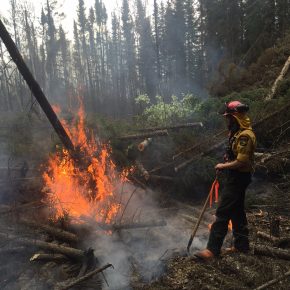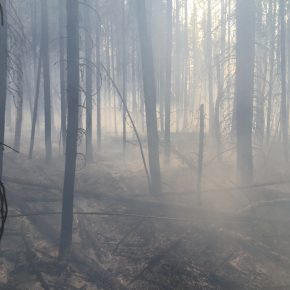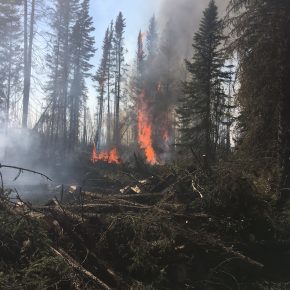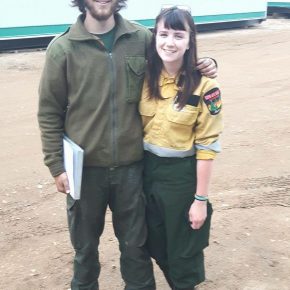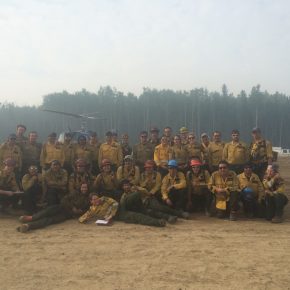David Camp: Alberta Wildland Firefighter
- David Camp containing a bushfire in Northern Alberta. Photo: David Camp
- David and fellow UNB Forestry student Cara Gillis.
- UNB Forestry student David Camp’s wild land firefighting crew along with other crews from Lac Labiche, Calgary and the Northwest Territories.
David Camp’s summer job isn’t a walk in the park – it’s more like a walk in the woods.
For the fourth summer in a row, the Maritime College of Forest Technology (MCFT) graduate and University of New Brunswick Forestry student is working as a woodlands firefighter in the vast wilderness of northern Alberta.
The MCFT program requires students to work at a forestry related job in the summer between first and second year. Camp was taking a forest management class as part of his fire course when he learned of the opportunity.
“I just applied, had a phone interview and the guy who interviewed me ended up being an MCFT grad, so I basically got hired on the spot and never looked back,” he said.
Camp is a member of the Alberta department of Agriculture and Forestry’s Wildfire Program as a ‘Helitack’ firefighter (Calgary Hats 5). His crew is based in Bragg Creek, a town about 40 minutes south-west of Calgary but they are sent to various locations across the province depending on weather conditions increasing the risk of fire.
Their base was originally built for accommodation during the 1988 Olympic Games in Calgary. There are seven bunk cabins and one bigger one used as a kitchen. “It’s kind of like a summer camp type of thing,” he said.
Under low hazard conditions, Camp’s crew performs water pump and saw practices to maintain their skills and ensure their gear is ready to go. They take advantage of time off the clock, arranging football or soccer games for a few laughs, or hikes in the nearby mountains.
When the fire hazard is high, the crew is on stand-by at a day base until they receive a call. Under these circumstances, they are deployed by helicopter to the fire site within five minutes of receiving the call – that’s when the adrenaline kicks in.
“We jump in a helicopter, which is an amazing thrill to fly through the mountains, and we fly over this giant fire that’s raging – we land on it, action it, then put it out,” Camp said.
<iframe width= »560″ height= »315″ src= »https://www.youtube.com/embed/U2eEH326f5g » frameborder= »0″ allowfullscreen></iframe>
Camp’s four-man ‘initial attack’ crew is first on the scene. After they land on the fire line, their first task is to find a water source. Using a small pump called a striker and around 800 feet of hose line, they begin to suppress the flame. If there’s not enough water in the area for the strikers, the helicopter suppresses the fire with water buckets while the crew uses hand tools to prevent the flames from spreading.
The location of the fire determines where the crew bunks for the night. Sometimes they’ll be lucky enough to sleep at an oil camp. Often, they set up tents and make the forest their home for the night.
Camp enjoys the dynamic nature of the job. Each workday is unique since it’s impossible to anticipate when a fire will spark. One minute the crew is shooting the breeze at base, the next they’re flying over the Rocky Mountains heading into a boreal inferno with hoses in hand.
“We’re given a big problem out here, but within that we’re able to break it down into smaller ones to manage it,” he said. “You fight the smaller battles to overcome the bigger ones.”
Sometimes there are problems before the crew even hits the ground. Camp remembers a particular flight where the pilot nearly crashed the crew’s chopper while trying to navigate the hilly terrain.
“We were flying through the mountains and the air is so thin, we were a pretty heavy load in a big helicopter,” he said. “The helicopter wasn’t able to get enough lift and the pilot had to bank really hard, we were like two feet away from the mountain.”
When the fire hazard is high, the crew typically works ten or twelve-hour days – but Camp doesn’t mind. He finds the work very exciting and rewarding. But working for the department four years consecutively also opens many doors moving forward.
“There’s tonnes of opportunity for you to grow within the company,” Camp said.
There are also many opportunities to work internationally within the profession. Camp has friends who have moved to Australia or New Zealand to continue working after the Canadian summer since the seasons are different in the Southern Hemisphere.
As he approaches the end of his program at UNB, Camp says he can imagine turning the summer job into more of a career as he transitions into the workforce.
“By next year or the year after, I’ll be a crew leader. By that point I’ll have my degree, so then I’ll just move out to Calgary and look to move up in the chain,” he said. “The office I work for is always keeping tabs on me with how I’m doing in school and seeing what opportunities I have to move ahead and continue my training out here. This is a long-term thing for sure.”

